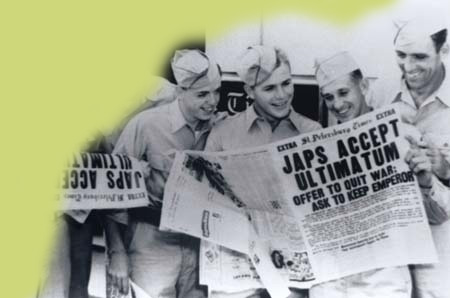War's Impact on Florida: The War Ends
By 1944, the war had turned in favor of the Allies. Continued advances in the Pacific, the Allied invasion of Nazi-occupied Europe in June, and the Soviet forces that were sweeping through eastern Europe confirmed this fact. In the November 1944 state elections, Democrat Millard Caldwell won the governorship. In his opening address to the legislature in April 1945, he emphasized postwar development and economic issues, indicating that many Floridians were already looking forward to the end of the war and to the state's role in the postwar era. The spring of 1945 brought the death of Franklin Roosevelt and also the surrender of Nazi Germany. Floridians joined the country in celebrating V-E (Victory in Europe) Day on May 8, 1945.
Still, Floridians knew that Japan remained to be defeated. Fears of a costly Allied invasion of the Japanese home islands proved unfounded. Shortly after the explosion of atomic bombs on Hiroshima and Nagasaki in August, Japan agreed to surrender terms. Floridian pilot Paul W. Tibbetts piloted the B-29 Enola Gay, which dropped the atomic bomb on Hiroshima. "Peace Comes to the World," announced the Florida Times Union on V-J (Victory over Japan) Day August 15, 1945. The Fort Lauderdale News and Evening Sentinel reported the city "a Bedlam as Happy Crowds Celebrate Victory over Nipponese." Another round of celebrations swept the state after the formal Japanese surrender on September 2, 1945. Over the following months, servicemen and servicewomen returned home, many military bases were deactivated, and Floridians could reflect on their wartime achievements while looking forward to postwar prosperity.


Soldiers outside of the St. Petersburg Times reading about the end of the war
(St. Petersburg Museum of History)


